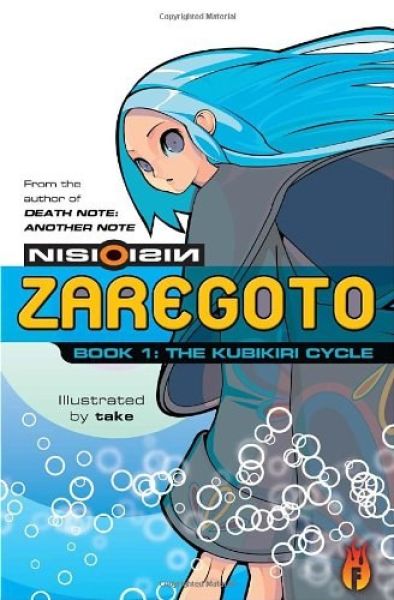No Colors Any More
Kubikiri Cycle (Zaregoto, volume 1)
By NisiOsiN

27 Sep, 2017
0 comments
2002’s Kubikiri Cycle is the first volume in NisiOisiN’s Zaregoto series. The 2008 English translation is by Greg Moore.
Exiled to Wet Crow’s Feather Island, Akagami Iria surrounds herself with the world’s best and brightest, people at the pinnacle of their chosen fields. But one resident, nineteen-year-old Il-chan, is no such genius. His lesser status gnaws at him. There’s no cure; for him, study and practice would be futile. But the fact that he knows he is a comparative dullard means that he is aware of his mediocrity — which fact bars him from the Garden of Eden that the truly dim enjoy.
Il-chan is on the island because his best friend Kunagisa Tomo is there. Kunigisa is a genius in her field of computer science. Outside her specialty, she is incapable of even minimal self-care or day-to-day competence. It’s Il-chan’s job to protect her from her own tunnel vision. Why would he do this? Well, certainly not because he’s in love with Kunagisa. That would be attachment and attachment is a fool’s game.
The guests in residence are a colourful lot: in addition to Kunagisa, they include Ibuki Kanami (painter), Himena Maki (psychic), Sashirono Yayoi (chef), and Sonoyama Akane (genius at being a genius). Some are more likeable than others; the psychic uses her insights to needle Il-chan for his many personal failings, but the chef’s food compensates for Maki’s abrasive company.
One of the guests is a murderer. Or so the inhabitants of the island conclude when they find one of their number lying in a pool of blood, the severed head nowhere to be seen. Akagami refuses to call the police to her refuge … but not to worry! Akagami Iria’s circle of genius friends includes the world’s greatest detective, Aikawa Jun. As soon as Jun arrives, they will no doubt expose the killer and restore order to the world.
But while they are waiting, they might as well do a little detective work themselves. They even settle on a likely suspect and prudently lock them up. This should prevent any further killings. If the suspect is the killer, they cannot kill while confined. If the suspect isn’t the killer, the real killer cannot kill again without clearing the suspect.
The decapitated corpse found in the prisoner’s cell reveals the flaw in the geniuses’ reasoning.…
~oOo~
Readers may wonder why, if Himena Maki is indeed a psychic, or even someone passing as one on the strength of her insight into human nature1, she does not solve the mystery with one wave of her woo-woo powers? Same reason that Akagami Iria didn’t call in the cops when a guest was decapitated. Both of them are selfish jerks.
In fact, the novel is a bit short on likeable characters, perhaps because we see all of them through the eyes of Il-chan, for whom life is pointless and contemplation only leads to despair. He is gloomier than Kurt Wallander. The world he sees through his filter of depression is gray and joyless. Small wonder that he doesn’t much like most people he encounters. He barely tolerates himself.
It’s a bad idea to psychoanalyze fictional characters, especially in a world like NisiOisiN’s, one in which psychological disorders may not map one-for-one onto real world diagnoses. And yet, I could help wondering if Il-chan might benefit from therapy or medication. Or both. I rather suspect that he would refuse to face up to his problems. His friend Kunagisa cannot help; she’s your stereotypical Aspie nerd, oblivious to social cues. Poor guy.
This book reminded me of the unjustly obscure The Dog Park Club, which also pits a group of non-detectives against a mystery. Surprise! People without the necessary skills are not the best people to handle a demanding task. Il-chan reluctantly does his best; his reward is a lecture from Jun pointing out all the procedural errors that Il-chan has made. Instruction suggests that Jun sees potential in the supposed dullard. Even in successm all morose Il-chan can see is failure. Such is life.
Kubikiri Cycle is available here (Amazon) and here (Chapters-Indigo).
1: What evidence readers are given suggests that she really is a psychic.
